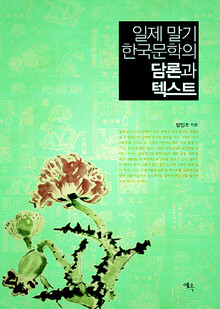hankyoreh
Links to other country sites 다른 나라 사이트 링크
Writing during dark ages of Japanese occupation reexplored

By Choi Jae-bong, Literature Correspondent
For researchers studying Korean literature, the latter period of Japanese occupation has remained somewhat of a weak point. During this period, which has often been called the “dark ages of Korean writing,” there were in fact a number of writers who left writings behind in some form. What is the proper view to take on these writings, which pandered to the Japanese system of wartime forced mobilization and were occasionally written entirely in Japanese? They cannot be presented and defended, but neither can they be stuffed into a corner of collective memory and ignored as a shameful history.
Professor Bang Min-ho of the Seoul National University Department of Korean Literature refuses to dodge this formidable battle in his new book “Discourse and Text in the Korean Literature of the Late Japanese Occupation” (Ye-ok). He shows the passion and adventuresome spirit of a researcher willing to tackle the theme head on. As described in the foreword, the 16 papers collected in the thick, nearly 600-page book take as their subject matter the period “from around 1937, when Yi Sang went to Japan and met his death, to around 1945, when Liberation took place.”
As the author stated in the foreword, the aim of the book was to show that “in spite of the prevailing belief that the Korean literature of the late Japanese occupation was a ‘dark ages literature’ and that [writers] were thus unable to produce worthy Korean-language writing, there were in fact writers, poets, and critics who created the values of the future under the harsh conditions of a painful era.”
Most centrally, Bang wished to reevaluate authors like Lee Hyo-seok, Chae Man-sik, Lee Tae-jun, and Park Tae-won, who were forced to write “pro-Japanese” work due to intimidation and cajoling from authorities. Bang argues that while these writers did address themes in line with Japanese propaganda in novels written in Korean and Japanese, including the “oneness of Korea and Japan” and “greater East Asian co-prosperity,” they also presented criticisms and opposition to Japanese rule through rhetorical devices, disguise, and analogy in their more personal short fiction.
For instance, Park Tae-won’s short story “The Indebted Family,” whose protagonist Bok-sang struggles to resolve the issue of a debt to the Japanese creditor Watanabe without having to meet him, is interpreted as “showing the lives of Koreans mortgaged to Japanese people, Japanese money, the Japanese language, and the Japanese family system, like someone bearing a heavy debt.”
Likewise, Bang says that “Blade of Glass” and other works of “personal fiction” by Lee Hyo-seok “may not present a direct and explicit refusal of the system, but they maintain a position of clear repudiation of a situation in which the discourse of politicism runs rampant through wartime policies and mobilization and national literature.”
Please direct questions or comments to [englishhani@hani.co.kr]
Editorial・opinion
![[Column] Park Geun-hye déjà vu in Yoon Suk-yeol [Column] Park Geun-hye déjà vu in Yoon Suk-yeol](https://flexible.img.hani.co.kr/flexible/normal/500/300/imgdb/original/2024/0424/651713945113788.jpg) [Column] Park Geun-hye déjà vu in Yoon Suk-yeol
[Column] Park Geun-hye déjà vu in Yoon Suk-yeol![[Editorial] New weight of N. Korea’s nuclear threats makes dialogue all the more urgent [Editorial] New weight of N. Korea’s nuclear threats makes dialogue all the more urgent](https://flexible.img.hani.co.kr/flexible/normal/500/300/imgdb/original/2024/0424/7317139454662664.jpg) [Editorial] New weight of N. Korea’s nuclear threats makes dialogue all the more urgent
[Editorial] New weight of N. Korea’s nuclear threats makes dialogue all the more urgent- [Guest essay] The real reason Korea’s new right wants to dub Rhee a founding father
- [Column] ‘Choson’: Is it time we start referring to N. Korea in its own terms?
- [Editorial] Japan’s rewriting of history with Korea has gone too far
- [Column] The president’s questionable capacity for dialogue
- [Column] Are chaebol firms just pizza pies for families to divvy up as they please?
- [Column] Has Korea, too, crossed the Rubicon on China?
- [Correspondent’s column] In Japan’s alliance with US, echoes of its past alliances with UK
- [Editorial] Does Yoon think the Korean public is wrong?
Most viewed articles
- 1‘We must say no’: Seoul defense chief on Korean, USFK involvement in hypothetical Taiwan crisis
- 2Will NewJeans end up collateral damage in internal feud at K-pop juggernaut Hybe?
- 3[Column] Park Geun-hye déjà vu in Yoon Suk-yeol
- 4Why Korea shouldn’t welcome Japan’s newly beefed up defense cooperation with US
- 5Thursday to mark start of resignations by senior doctors amid standoff with government
- 6N. Korean hackers breached 10 defense contractors in South for months, police say
- 7[Guest essay] The real reason Korea’s new right wants to dub Rhee a founding father
- 8[Column] ‘Choson’: Is it time we start referring to N. Korea in its own terms?
- 9Kim Jong-un expressed ‘satisfaction’ with nuclear counterstrike drill directed at South
- 10[Editorial] New weight of N. Korea’s nuclear threats makes dialogue all the more urgent